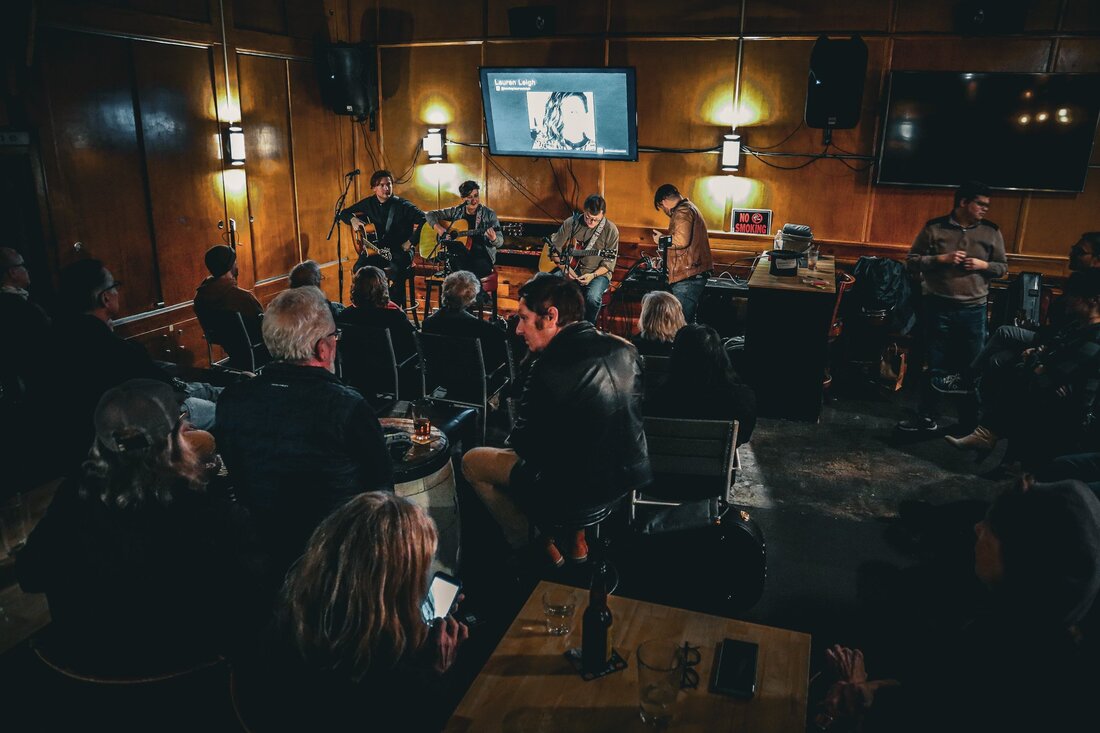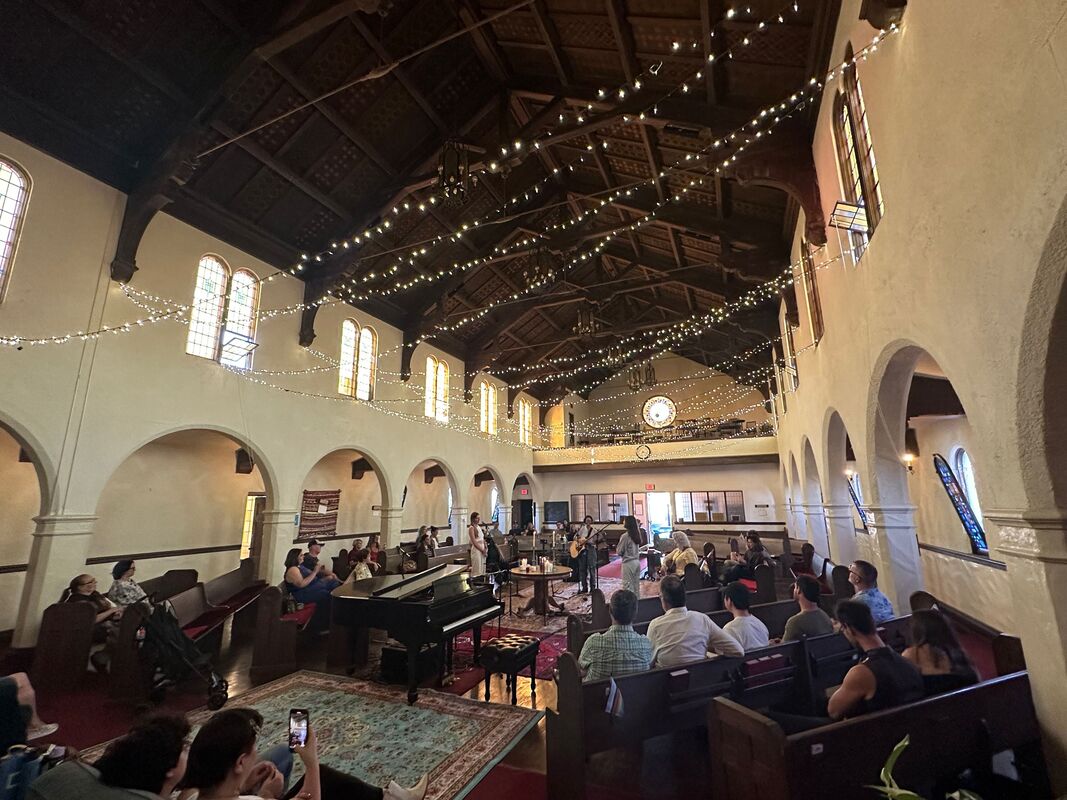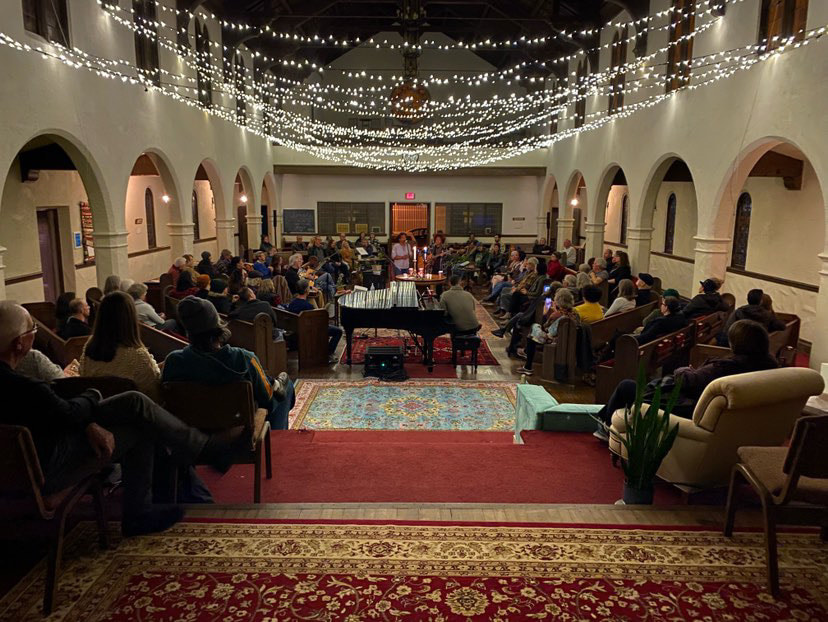|
Thanks for sticking around for the second and final part of this blog series, where I talk about the local songwriter scene, community-building, the cost of living, and how they all intersect. (ICYMI, you can read part one of the series for some more context about the plight of local creatives trying to survive in a city as unaffordable as San Diego.) Community is Key for WRSD The only solution I can suggest for such a fiasco is one that’s been offered up a million times over from indigenous folks and Black and Brown folks and queer folks and migrants and abolitionists and organizers that have been bearing the brunt of garbage systems since colonialism splooged all over the West in the name of God or gold or manifest destiny or whatever other shiny phrase white people use to justify murder, theft, and destruction. That solution is: deciding to invest in hyper-localized communities and the people who build them. Take care of each other by making communal choice after communal choice after communal choice, until any system based on individual gain suffocates because no one needs to buy what it’s selling because everyone already has what they need. Because community. This brings me back to the San Diego songwriting community as it stands today: in our own way, we are navigating fucked up systems to not only preserve and propel a legacy of overwhelming San Diego talent that rivals any Nashville nook or Hollywood cranny, but to also create solutions toward a more compassionate and sustainable future. Not stepping on each other to get ahead, but lifting each other up. Essentially, making the communal choice not to feed the beast but to protect each other from the beast. Leading the charge in this effort for WRSD and Songwriter Sanctuary are newly appointed hosts Lauren Leigh Martin and Jeff Berkley, who both use words like “humbling,” “incredible,” and “honored” when describing what it feels like to carry forth the vision Ben and Karyn brought to life. Both San Diego natives and wowee-wow-wow-wowza multi-hyphenate talents, Martin and Berkley share between them a quadruple-middle-finger-level of resilience and outright refusal to go down for the count in a city that effectively works against its finest contributors. As full time creatives and parents who have experienced their fair share of hard knocks, they possess not only the grit to get by, but the life experience to know you don’t get anywhere (karmically speaking) by leaving other folks behind. Case in point: Martin, along with fellow community-builder and new WRSD sound tech Eric Neilson, have exciting plans in store for the Monday night WRSD gang, like offering affordable audio/video recordings of artist performances to help alleviate the pressure and expenses that come with the incessant demands of social media promotion and DIY content creation. This kind gesture (straight out of the Brazier playbook, rest his soul) may seem small, but can save independent artists hundreds of dollars while helping crack open seemingly dead-bolted doors of an industry where nearly every lucrative opportunity boils down to quality social content. In a city where most independent artists can barely scrape together rent let alone a marketing budget, this is huge. “What we do is not meaningless,” said Martin. “At times it can feel that way. Artists are undervalued and underpaid in this country which is a tragedy. We have created a culture in our city that is unlike other music cities, and word is getting out. There's something huge happening here and it's because it's centered in kindness and willingness to show up for each other.” A Collective Spiritual Experience at Songwriter Sanctuary Berkley echoes Martin’s community-minded ethos. His deep connections within the local music scene, both on stage and in the studio, make him an ideal fit to guide the Songwriter Sanctuary series forward. “Getting to be around singer-songwriters is my happy place…I miss Java Joe’s, and this feels like that did,” he said. The century-old sanctuary space at Normal Heights United Church sets the ideal stage for fostering the Flamminian (I made this word up, but it works) listening room environment that helped catapult Jason, Jewel, and Poltz into the stratosphere of household names and world tours. Beyond its physical charm, the church emphatically welcomes individuals of all backgrounds, ages, and identities (weird that that feels like a selling point when it should just come standard for any tax-exempt institution, but here we are trying to kick drag queens out of library storytime while still not really admitting where rampant indoctrination actually tends to happen, but I digress), making it the perfect setting for an evening that, according to Berkley, “resonates both audibly and spiritually.” Growing up a preacher's kid who has spent decades performing in not only churches but also living rooms, backyards, bars, concert halls, amphitheaters, and everything in between, Berkley knows precisely what it takes to whip up and tap into a collective energy created by heartfelt music and engaging storytelling. “Getting to help set the stage and help guide folks into that magical space is one of my favorite things to do,” he said. Where WRSD is a casual space for songwriters to hone and test their craft in rowdy (but quietly respectful during performances) weekly camaraderie, Songwriter Sanctuary is a place where seasoned performers have the freedom to delve deeper into their unique expressions and the hearts of attendees. These attendees, in turn, show their appreciation with financial donations, which go directly to the artists in a beautiful exchange of reciprocity, gratitude, and mutual aid. In a region where $50-150 entertainment budgets (no matter the set length, number of performers, or cost of living) have stuck to venues like decades-old crusty turd dust on the toilet, we love, love, love to see a venue that doesn't touch the door. As much as I believe that community-building and creativity can help take care of our “earthly” needs (bills, housing, quality content, lol) I would also argue that the needs of our spirits, or souls, or higher selves, or whatever vernacular you choose are similarly fulfilled by gathering energetically in a space where we can grieve, laugh, heal, and ultimately be reminded of our divine oneness. This is the kind of energy that hovers above all Songwriter Sanctuary shows. “It’s a profound experience for artist and listener both," said Berkley. "Something happens to music in that room. It blooms and blossoms. It multiplies exponentially.” What About You? Yeah, You.
Here’s the implore-y part of my weird little blog that is now officially a collection plate moment. (Cue: Arms of the Angel by Sarah McLachlan). Cynical skeptics might think, okay, but are we really going to solve the woes of our world, or even our zip code, with creativity and community? As a recovering cynical skeptic turned spiritual cocksure, I’ll just offer:
So my question is, how will you, dear readers and friends, practice ongoing community care to help sustain creativity in San Diego? There are endless ways to do it, but here are some suggestions:
As for the housing/financial travesty, I have some other ideas:
This list can go forever because grassroots community-building is always in action and grassroots community-builders always need more support. It feels like a lot in succession, but it's not. Cause all YOU have to do is pick one or two things and make a communal choice. Start with $5 a month or an hour of volunteer time a week. If my wiped out, struggling, barely-hanging-on-in-San Diego self can do it, I KNOW you can do it, too. Compassionate community and creativity is the only way to ease the overwhelm of these hashtag unprecedented times. Are you in? Hope so. Shoot me an email and let me know what you picked. I’ll close with a quote from Martin that I absolutely double dog ditto: “Show up. Regardless of your financial situation…What we are building is important and anyone can be a part of it.” And this one from Berkley, for funsies: “Can’t wait to see you there and tell some stupid jokes while I tell you where the bathrooms are! Being a preacher’s kid I’m just lucky I don’t turn into a pillar of salt when I walk in.” This article feels like a pillar of salty, thanks for reading the whole thing. :) Coming Up Writer’s Round San Diego is every Monday at the Ould Sod. Follow on Instagram for info/signups. The next Songwriter Sanctuary on Friday, September 29. Follow on Instagram, RSVP via Eventbrite, and visit the Songwriter Sanctuary website.
1 Comment
Bear with me, as this two-part blog series is basically a subpar word vomit of some of the things I’ve been wanting to say about the local songwriter scene, community-building, the cost of living, and how they all intersect. It’s part-opinion, part-interview, part sleep-deprived spatter, and it probably should be more eloquent, but I’m very much in survival mode and don’t really have the capacity to churn out anything other than scribbly musings, soooo make of this muck what you will, which is essentially the thesis of the whole dang thing in case you’re not feeling the TLDR version. Coming Back to Life Clear! Ben Grace Gilmore and Karyn Thurston Gilmore, spent much of 2022 and 2023 organizing not one but two events that helped resuscitate the San Diego songwriter scene: Writers Round SD (a weekly open mic Nashville-style round with a curated feature round) and its sibling event Songwriter Sanctuary (a monthly concert series in a beautiful historic venue). Their community-building prowess is nothing less than remarkable, especially considering their other responsibilities (raising a kiddo, tending to writing and recording clients, and watering their own indie folk duo project Story & Tune). Especially especially considering the somewhat bleak local singer-songwriter situation they entered following the height of the pandemic and the shutdown of iconic music venues like Java Joe’s and Lestat’s West. (Cue: tumbleweeds rolling across the city.) For myself, a new mom struggling to resuscitate her own creative identity (for what feels like the fifth goddamn time post-The Lovebirds, post-dead mom, post-Lady Brain, post-pandemic, postpartum) WRSD was the thing I didn’t know I was missing so dearly until I experienced it. It was just as much a nostalgic nod to the past as it was a hopeful wave to the future. As the open mic series began to take root (first at Park & Rec in University Heights, then moving to its current home at the Ould Sod), Ben and Karyn got to work on the Songwriter Sanctuary in partnership with Normal Heights United Church. This extended-format monthly series brings three acts together in the round, both musically and literally, as the century-old venue’s seating encircles the performance area, making for quite the immersive and intimate experience. Still in its inaugural year, the series has featured veteran troubadours including Lisa Sanders, Joel Rafael, and Mark Montijo, alongside emerging talents such as Flamy Grant, Anna Ballew, and Joy Fuliga. (Not to mention middle-aged twats like me…hair flip.) Everything the pandemic threatened to strip away from our creative and communal human experience, these events aim to restore. There is a palpable energy of gratitude in the air as local songwriters fill these spaces, not only with their heartfelt tunes, but with an eagerness to experience music and togetherness as a collective unit in a singular location. It’s a gift to be savored because we know all too well how quickly it can be taken away. Joy Fuliga, accompanied by James Bishop, with a transcendent Songwriter Sanctuary performance America’s Finest Least Affordable City
There’s no question that both WRSD and Songwriter Sanctuary have become fixtures in San Diego's burgeoning songwriting community, but sadly, the series founders won’t be around to shepherd these projects into the future. With their recent move to Portland, Ben and Karyn join an ever-growing list of local artists and community-builders who make the tough choice to leave their beloved city of San Diego and the state of California for (among other reasons) more stable and affordable housing. It doesn’t seem like the kind of thing I can get my wife’s boss Todd Gloria and other City Hall suits to care about, but maybe I can appeal to you. Reports vary, but San Diego is always a top ten, if not first place, contender for Most Expensive Places to Live. Of course, you don’t need any official census data to reveal evidence of a major housing and financial crisis: you can see it for yourself via ludicrous rental listings, cars lined up around the block at most local food distributions, sprawling encampments, and thousands of our neighbors -- many in serious physical and mental crisis -- clinging to survival in America’s finest least affordable city. As the cost of living rises due to rampant inflation, stagnant wages, and the gobbling up of housing inventory by greedy corporations and short term rentals, low-income and working-class residents (including local creatives such as moi), are struggling to stretch this month’s last dollar to next month’s paycheck. This local problem is reflective of a national economic system that is not failing, but is functioning as designed to over-resource the ultra-rich at the expense of everyone else. (To be clear: it’s not a sustainable system and will ultimately and inevitably collapse as all available natural and human resources are extracted to the detriment of our planet and species). Woof. On a larger scale, it feels hopeless, right? We might as well just keep doom-scrolling and shouting into the social media void til all the insulation between any financial security we enjoy and our ability to survive slowly erodes and we are met with a choice to fight, flight, or freeze against the zombies or the Bezos-Gates-Waltons or flood-hurricane-earthquake-drought-tornado-tsunami or the second coming of Jesus or whatever immortal, mortal, or natural disasters eat our brains or kick in our teeth or raid our last two cans of beans or take us to hell or whatever apocalyptic picture you want to paint. There is a big-time “I can’t even” stench steaming up over humanity as we circle the toxic drain of capitalism. I can smell it coming off myself, as I pull back on my own activism and community-building/fundraising efforts because I am utterly, physically, emotionally, and financially spent from the amount of work it takes to keep a roof over my daughter’s head. Fighting the snarling beast of late-stage capitalism feels impossible. How do you keep your neighbor’s family out of its jaws when your own family is in its claws? Check out part 2 when I tell you how. (I think you know how). |
Archives
April 2024
Categories
All
|



 RSS Feed
RSS Feed